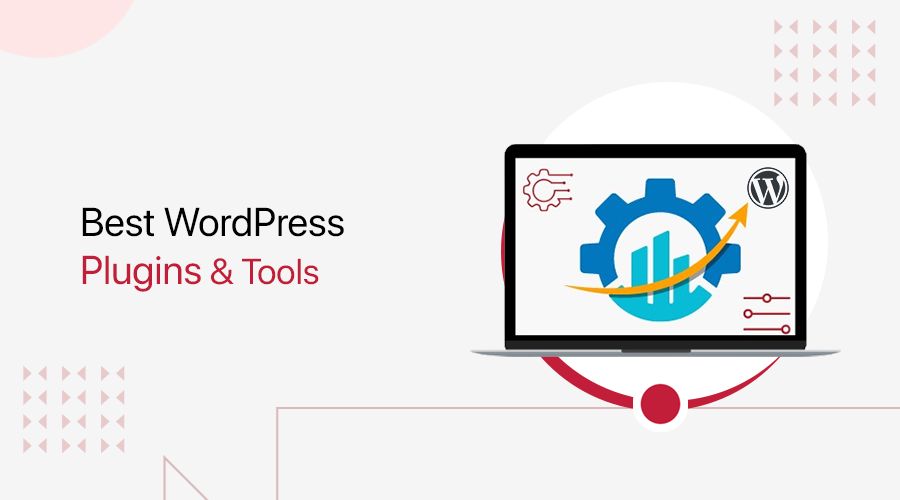
Looking for the best blogging platforms to make money in 2025?
You’re in the right place!
Blogging isn’t just a fun hobby! Rather, it’s a real way to earn money online. But to succeed, you need the right platform that helps you grow your blog and make money from it.
The knowledge of blogging platforms is essential for starters and even professional bloggers. It’s because different platforms have different unique features; you’ll have to decide which one serves you right.
As lots of popular blogging platforms are out there, it’s hard to choose one. But don’t worry! We’ve made it easier for you.
In this article, we’ll cover popular and best blogging platforms to make money. Just go through them, their pros, and cons to choose the best one that you think fits your needs.
Let’s go!
How to Choose the Best Blogging Platform?

Before heading to the list, you should know what things to look for in a blogging platform. Here are some important points.
- Blogging Features – Opt for features like post scheduling, social sharing, multi-authorship, post formatting, user management, comment system, and traffic analytics.
- Monetization Options – Most people start blogs to earn money. If that’s your goal, choose a platform that allows monetization. The easiest way is by integrating ad programs like Google AdSense.
- User-Friendliness – Blogging platforms should be easy to set up, manage, and post on, even for beginners. They should require no coding knowledge.
- Customization – Your blogging platform should offer themes, add-ons, tools, and settings to create and display posts uniquely according to your vision.
- Search Engine Friendliness – Being search engine friendly increases exposure, reaching more visitors through search engines. This boosts both your site’s traffic and income.
- Cost – Consider your budget before choosing a blogging platform. Many offer free plans suitable for limited needs. However, paid plans provide many more features.
Now, let’s dive into the list of the best blogging platform to make money. Then, choose the best platform to start a blog.
13 Best Blogging Platforms to Make Money 2025
Here’s our list of the best blogging platform to make money in 2025. We’ve included both free and premium website builders for your different needs. Make sure to go through them and select an ideal one. Let’s start!
1. WordPress.org
WordPress.org is one of the most popular open-source and free website builders. Today, more than 43% of all websites on the internet use WordPress. Plus, this self-hosted platform gives you full control of your blog site.
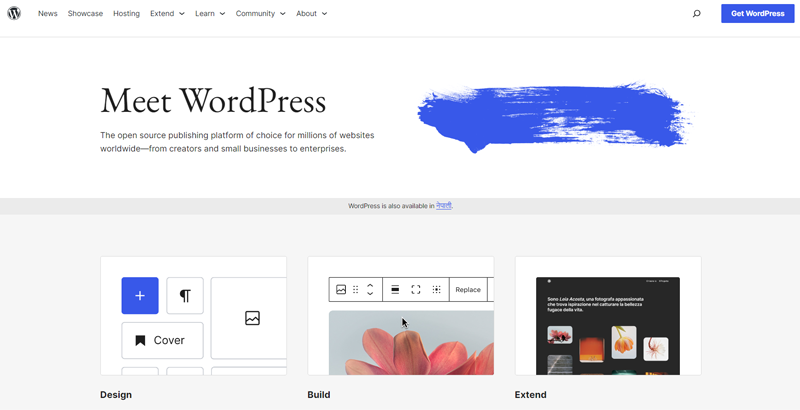
WordPress provides tons of responsive themes to design your blog exactly as you want. Similarly, you can use plugins to add more features like social sharing, ad monetization, SEO, security, etc. to your blog. So, when it comes to blogging, WordPress.org is arguably the best option.
Pros:
- Allows you to place ads on your website and sell those places to earn a commission.
- It gives you full control and ownership of your blog.
- You can easily build an eCommerce site with WooCommerce integration.
- Easy integration of forums, stores, memberships, etc in your blog.
- Also, it allows you to add custom titles, meta descriptions, image alt tags, etc. making your blog more SEO friendly.
Cons:
- Being a self-hosted platform, you’ll have to manage the domain and hosting by yourself.
- Has a little bit of a learning curve in the starting phase
Pricing:
WordPress is a completely free open-source platform. Hence, you can easily download it and use it to create your website.
However, it’s a self-hosted platform, so you’ve to take care of hosting, domain, and security. Some of the best hosting companies include Bluehost, Cloudways, DreamHost, SiteGround, etc.
For instance, SiteGround comes with 3 WordPress pricing plans:
- StartUp – $3.99/month; includes 1 website, 10 GB web space, 10K visits monthly, free SSL, and more.
- GrowBig – $6.69/month; includes unlimited websites, 20 GB web space, 100K visits monthly, free SSL, and staging environment.
- GoGeek – $10.69/month; includes unlimited websites, 40 GB web space, 400K visits monthly, white label, priority support, and more.
2. Blogger
Blogger is one of the best blogging platforms to make money online. It’s one of the oldest free blog site builders that just requires a Google account to get started.

Nevertheless, it’s an easy-to-use blog hosting platform suitable for beginners and non-techy bloggers. Indeed, you can choose from a selection of customizable templates with flexible layouts and hundreds of background images.
Moreover, it seamlessly integrates with Google AdSense. Hence, it automatically displays relevant targeted ads on your blog so you can get paid for your hard work.
Pros:
- With built-in analytics, you can see where your audience is coming from and what they’re interested in.
- Provide a blogspot.com domain or buy a custom domain with just a few clicks.
- Allows you to safely store thousands of posts, photos, and more with Google.
- It’s a fully-hosted platform. Hence, it takes care of web hosting, backup, and maintenance.
- Also, it’s easy to set up and create a blog without paying for anything.
Cons:
- Comes with limited themes and design options.
- Can’t extend and upgrade your blog with Blogger.
- The provided domain is a sub-domain of Blogger. You can also add your domain but that usually comes with a cost.
Pricing:
To your surprise, Blogger is an absolutely free blogging platform from Google. All you need is to sign up with your Google account and start building your blog site.
Are you in a dilemma between WordPress and Blogger? Then, you can read our guide to distinguish between them.
3. WordPress.com
WordPress.com is a fully-hosted site-building platform developed by Automattic. Its founder, Matt Mullenweg is the same person behind WordPress.org (fully-hosted version). In fact, both platforms use the same WordPress software but with different approaches.
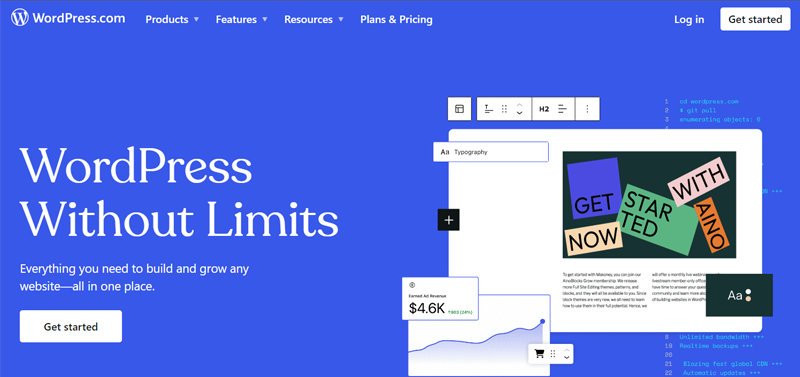
WordPress.com’s free blogging tool comes with some basic blogging features. You get limited storage, bandwidth, features, and sub-domains with it. However, you get additional features in the premium plan if you choose a paid upgrade.
Hence, WordPress.com is the best blogging platform to make money.
Pros:
- Easily installed: Just sign up, choose a sub-domain, and pick a plan
- Takes care of backup, maintenance, and other technical issues
- Provides adequate support, documentation, and tutorials
- Supports seamless platform changing.
Cons:
- Limited features and customization options.
- Using third-party themes and plugins requires upgrading to higher plans.
- You’ll have to share a portion of your ad revenue with WordPress.com.
- No full ownership of your blog.
Pricing:
Similar to WordPress.org, WordPress.com is also a free website builder. All you need to do is create an account, and your domain name will be yourusername.wordpress.com.
However, if you want a custom domain name then you need to purchase a domain name. You can purchase the domain from popular domain name registrars such as GoDaddy, Namecheap, etc.
Having said that, it comes with the following premium plans –
- Personal– $48 billed annually; includes a 1-year free domain, ad-free experience, email support, etc.
- Premium – $96 billed annually; includes live chat support, premium themes, style customization, and site activity log.
- Business – $300 billed annually; includes unrestricted bandwidth, DDoS mitigation, global edge caching, and more.
- Commerce – $540 billed annually; includes store customization, inventory management, extensions marketplace, sales report, and more.
- Enterprise – It’s a customizable pricing plan starting at $25000/year. You can contact their sales team and create your plans according to your requirement.
People find it pretty confusing between WordPress.com and WordPress.org. So, you can read our guide on WordPress.com vs. WordPress.org to find the differences between them.
4. Tumblr
Tumblr is an all-rounder blogging platform for sharing photos, music, video, links, quotes, GIFs, text, and other multimedia. It’s a highly customizable and easy-to-use blogging site.

To start, just sign in to Tumblr, and choose a username (sub-domain). Then, you can start creating a blog on your desired niche. Even more, it’s a perfect platform for anyone wanting to stand out from the crowd or express their creativity on their blog.
Likewise, you can monetize your Tumblr blog with ads via Google Adsense or other services. You can make money when someone visits your blog and click on ads that appear there. That’s why it’s the best free blogging platform to make money.
Pros:
- You can publish unlimited content with no bandwidth or storage limits.
- Allows you to use your own custom domain name so that it’s truly personalized.
- Provides integrated social sharing options with Twitter, Facebook, and more.
- Also, it works perfectly with blog analytics tools such as Google Analytics.
Cons:
- Hard to make money out of this platform.
- Also, it includes limited features.
Pricing:
Tumblr is a completely free-to-use blogging platform. You can build your Tumblr blog in no time without paying for anything.
5. Weebly
Weebly is another best blogging platform to make money online. It lets you easily add blogs to your pre-existing business or other websites.
Indeed, it comes with a powerful drag-and-drop builder and customizable templates. Hence, it gives a serene experience to create a blog with an eye-catching design.

To your surprise, it provides dedicated ad spaces to display ads on your blog site. You can sell the space to allow others to display their ads on your website. Also, you can make money by selling products and services online.
Pros:
- It provides complete eCommerce solutions to grow your business online.
- Allows you to build, edit, and manage your website from your mobile device.
- It has built-in SEO tools that help search engines find your website online.
- You can access dozens of themes via the Weebly App Center.
- Also, it provides reliable and free hosting for exceptional site performance.
Cons:
- Places ads on your site on the free version.
- It gives less creativity and customization options.
- Limited third-party integration.
Pricing:
Weebly comes with the following pricing plans –
- Free – $0; includes free SSL certificate, 3rd party embed code, lead capture, basic eCommerce features, and more.
- Personal – $10/mo billed annually; includes a custom domain, popup notifications, shipping calculator, inventory management, and everything from Free Plan.
- Professional – $12/mo billed annually; includes unlimited storage, free domain, advanced site stats, and everything from Personal Plan.
- Performance – $26/mo billed annually; includes password protection, item reviews, property support, and everything from Professional Plan.
You can also check detailed comparisons of WordPress vs Weebly and get more ideas.
6. Wix
Wix is a self-hosted platform for building any kind of website. So, it has been effectively used to build blogging sites. Wix presents Artificial Design Intelligence (ADI), which designs your site based on your preferences. Or, you can also go manually; choosing a template and customizing it.
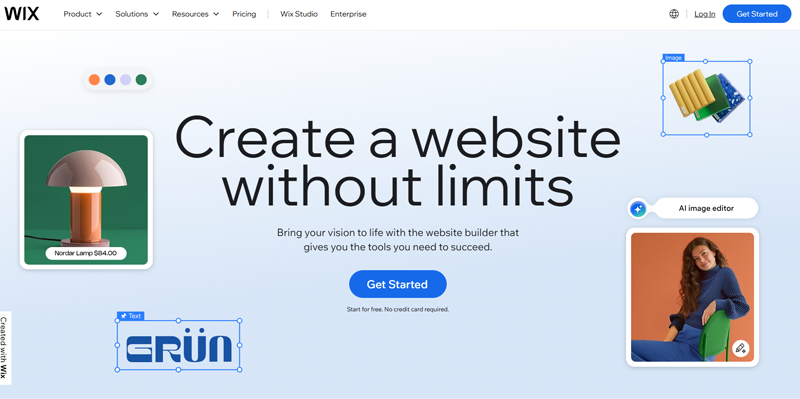
Likewise, you can easily integrate your website with AdSense using the Google AdSense app. All you need to do is download the app and follow the steps to verify your Wix website with Google AdSense.
Furthermore, Wix is an excellent choice for building an eCommerce store too. Hence, you can sell your products, merchandise, online courses, and more. In this way, Wix is the best blogging platform to earn money.
Pros:
- You can choose from 500+ custom templates for different business needs.
- Includes advanced eCommerce features like coupons, discounts, payment methods, etc.
- Allows you to track your website’s performance and statistics with the help of its analytics.
- It’s a self-hosted provider and provides its own hosting on cloud servers.
- Also, it includes lots of apps such as newsletter tools, online booking widgets, etc.
Cons:
- The free version will display ads and branding on your site.
- Limited integration with third-party tools.
Pricing:
Wix lets you get started with website building for free. Although it offers limited features, it’s still best if you’ve just started building your first website. It offers some templates, basic customization options, web hosting, etc.
Meanwhile, Wix also comes with the following premium pricing plans –
- Light – $17/mo. 2 collaborators, 2 GB storage space, light marketing suite, and free domain for 1 year.
- Core – $29/mo. 5 collaborators, 50 GB storage space, basic marketing suite, basic site analytics, accept payments, and more.
- Business – $36/mo. 10 collaborators, 100 GB storage space, standard marketing suite, free domain for 1 year, standard site analytics, standard eCommerce, etc.
- Business Elite – $159/mo. 100 collaborators, unlimited storage space, an advanced marketing suite, advanced site analytics, and so much more.
If you’re confused between Wix and WordPress, then here’s a comparison article. Also, go through the best Wix alternatives article to make a perfect choice.
7. Medium
Undoubtedly, Medium is the quickest and easiest way to start blogging. It’s a completely free-to-use blogging platform with a little bit of a different approach. Indeed, it’s a joint platform or community where writers publish their content and other members can access it.

Nevertheless, it lets you easily monetize your blog and make money out of it. You need to join their Medium Partner Program to be eligible to earn money from your content. After that, you’ll be automatically paid every month based on reading time from Medium members.
In a nutshell, Medium is the best blogging platform to make money.
Pros:
- With Medium, you can quickly get started; just signing in is required.
- It lets you easily connect with the existing community of bloggers.
- You don’t need prior knowledge about themes or plugins to use the platform.
- Also, it supports publishing blog posts on any niche.
Cons:
- In comparison to its competitors, it offers limited features.
- It doesn’t let you own the domain name; instead, your domain name will be yourusername.medium.com
- You cannot run your own ads.
Pricing:
Hands down, Medium is one of the best free blogging platforms.
However, you can also purchase its membership plan at the cost of $5 per month. With that, you can read member-only stories, earn money for your writing, support writers you read most, and so much more.
8. Ghost
Ghost is an open-source CMS that focuses solely on blogging. Being a user-friendly program, beginners can kickstart their blogging career from Ghost. With the easy setup procedure, you can create your blog site in no time. You can start with a free trial.
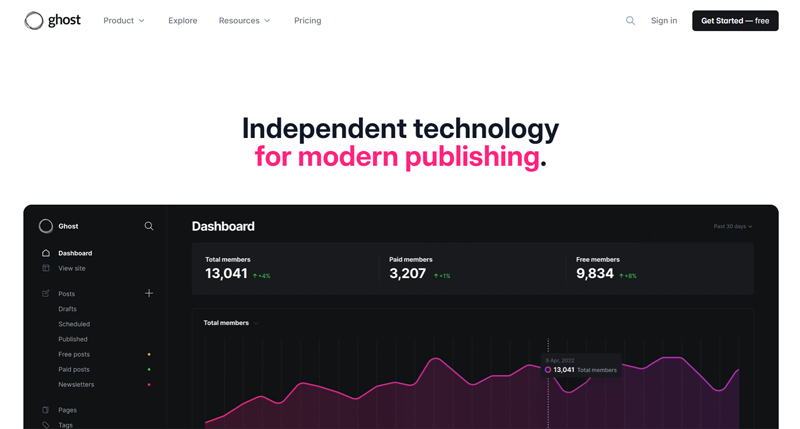
In addition, it allows you to start a blog and monetize it through Google AdSense. In fact, you can even add ads to your website.
Even more, you can build a membership business site. Hence, you can make money from blogs, newsletters, music, and videos by offering premium memberships to your audience.
Pros:
- You can create separate staff accounts for the whole team.
- Provides hundreds of free and premium themes for your website.
- Allows you to manage your blog post easily – publish right away, save as a draft, or schedule.
- Works seamlessly with other applications like Google Analytics, Youtube, Slack, etc.
- Comes with fully responsive and mobile-friendly designs with integrated AMP.
- Also, provides you with full control over the content of your blog.
Cons:
- Doesn’t support adding an online store to your blog.
- Limited customization – Lacks customization tools like drag-and-drop builders.
Pricing:
As mentioned above, Ghost is a completely free open-source CMS platform. Just like WordPress, anyone can use it to build a website, publish content, and send newsletters.
However, if you want to offer premium content to your members, you can go with its paid subscription features.
- Starter – $9/month billed yearly for 500 members. You get 1 staff user and 18 free official themes.
- Creator – $25/month billed yearly for 1000 members. 2 staff users, unlimited custom themes, 1000+ integrations, etc.
- Team – $50/month billed yearly for 1000 members. 5 staff users, priority support, and higher usage limits.
- Business – $199/month billed yearly for 10000 members. Unlimited staff users, advanced configurations, and 99.9% uptime.
9. Drupal
Drupal is a free, open-source platform that started in 2001. Not only a blogging medium, but it’s an entire Content Management System (CMS). Lots of big names, organizations, and companies have used Drupal for creating their site.
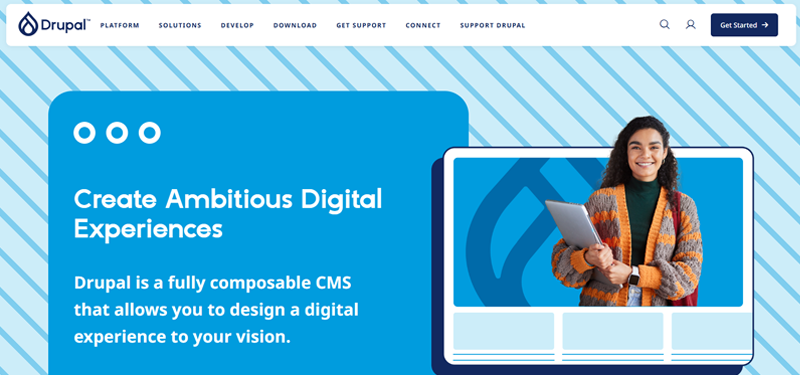
Moreover, it allows you to sell products and services from your blog site and make money out of it. You can manage products, carts, and transactions alongside your blog content.
Similar to WordPress, Drupal is also a self-hosted platform. Hence, you can have your own choice of web hosting service and domain.
Pros:
- Provides content monetization tools to increase revenue and grow your brand.
- Comes with digital asset management support to increase creative and editorial workflows.
- It’s an open-source platform so you’re free to modify the source code as well.
- You can perfectly model your content and product data model, including rich search interfaces and product pages.
Cons:
- Comes with a slight learning curve for beginners.
- Also, upgrading to its advanced features can cost you a bit more.
Pricing:
Drupal is a completely free-to-use open-source platform. You can use it to build any type of website you want.
Indeed, it also comes with premium products and services. However, Drupal hasn’t mentioned its pricing information clearly on its website. Hence, you might need to contact the Drupal sales team to ask about current pricing.
10. Gator
Gator Website Builder is a website builder powered by HostGator, the popular hosting service. You can use it to build any kind of software including a blog, without coding. The easy drag-and-drop builder makes the site-making process easy.

This platform is good for newbie bloggers with no experience at all. It provides an all-in-one hosted solution to create your blog site without any trouble. Plus, there are many essential features packed together.
Pros:
- You can easily customize your blog with the drag-and-drop builder.
- Quick and easy setup – no technical knowledge required
- It provides a free domain and SSL certificate.
- Allows you to set up an online store and sell goods and services.
Cons:
- Gator provides only premium service. No free plan is available.
- It comes with limited features and extensions.
Pricing:
Gator Website Builder is a premium platform that comes with the following plans –
- Gator Express Start – $4.84/month, free domain, free SSL certificate, 3 email campaigns per month, 3% transaction fee, and 3-product online store.
- Express Site – $6.99/month, free domain, free SSL certificate, 5 email campaigns per month, and 10-product online store with a 3% transaction fee.
- Express Store – $10.22/month, free domain, free SSL certificate, 10 email campaigns per month, appointment booking, and unlimited product online store with no transaction fee.
11. Squarespace
Another best solution for a blogging platform to make money is Squarespace. It helps you build visually appealing websites with a good set of blogging tools and features.

In fact, it includes advanced eCommerce features to help you build your dream online store. Some of the notable features include shipping labels, product merchandising, member areas, order management, etc.
Pros:
- Integrates with Google AdSense and lets you select the position and place to add your ads to your blog.
- You can add links to the products and earn a commission on sales after visitors from your site purchase those products.
- Offers advanced marketing functions like mailing lists, email campaigns, social selling, etc.
- You can view your customers, subscribers, donors, and members in the profiles panel.
- Also, it includes a free domain for 1 year with annual plans, which you must renew later.
Cons:
- It doesn’t include any free plan.
- The templates and designs are limited compared to alternatives.
Pricing:
Squarespace comes with the following 4 price options to choose from.
- Personal – $16/mo pay annually, $25/mo pay monthly, 2 contributors, audience management, free custom domain, SSL security, etc.
- Business – $23/mo pay annually, $36/mo pay monthly, unlimited contributors, sell unlimited products, 3% transaction fee, Personal features, and more.
- Basic Commerce – $28/mo pay annually, $40/mo pay monthly, Point of Sale, product reviews, customer accounts, Business features, and others.
- Advanced Commerce – $52/mo pay annually, $72/mo pay monthly, sell subscriptions, advanced discounts & shipping, Basic Commerce features, etc.
If you’re unsure which to choose between Elementor and Squarespace, then don’t worry. We’ve made it easier for you with this comparison guide.
12. Joomla
Joomla is a free and open-source Content Management System (CMS). It’s one of the largest CMSs on the web. Because it’s user-friendly, extendible, and responsive, it’s loved and trusted by millions of users. About 2.2% of websites run on Joomla, which is still a great figure.

With Joomla, you can effectively monetize your blog site and make money out of it. To do so, you start selling products, online courses, or membership content. The best part is that it also allows you to publish sponsored posts too.
Additionally, you can even sell ad spaces on your Joomla website. In fact, you can find several free extension that allows you to display image or text ads/sponsors on your website. Thus, Joomla is the best blogging platform to make money.
Pros:
- It comes with a wide range of content management features.
- Tons of extensions are available.
- Good customer support, plus tutorials and discussions.
Cons:
- Has a steep learning curve; not very easy to use.
- Doesn’t provide domain and hosting.
- Limited customization options.
Pricing:
Joomla is forever free open-source software. It’s created, maintained, and supported by a huge community group from around the world.
13. Site123
Site123 is yet another best blogging platform to make money. You can easily add and publish posts without any hassle. Also, it comes with blog templates that are responsive and fairly customizable.
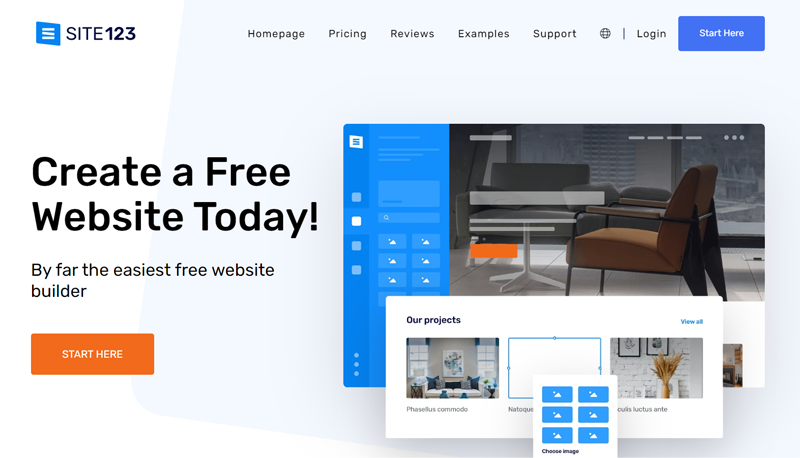
Although it doesn’t come with any advanced monetization tools, it seamlessly integrates with Google AdSense. Hence, you can sell ad spaces in your blog and earn a commission from it. Or else, you can set up an online store and start selling products from it.
Pros:
- It provides a free account.
- Good customer support.
- Excellent conduct of security, backup, and maintenance.
Cons:
- Comes with limited in-depth blogging features.
- No third-party integrations.
Pricing:
Site123 is a freemium website builder that comes in both free and premium versions. Its free plan includes 250 MB storage, 250 MB bandwidth, and a subdomain.
Meanwhile, its premium plan cost $5.80 per month. Indeed, it offers a free domain for 1 year, 3 GB storage, 3 GB bandwidth, and more.
FAQs on Best Blogging Platforms to Make Money
1. How can you make money from your blog?
You can either make money from your blog site by selling physical/digital products, services, online courses, memberships, and guest posts. Meanwhile, you can even sell a place on your website for advertisement and monetize it.
2. What are some of the best blogging platforms to make money?
WordPress, Wix, Squarespace, Blogger, Medium, and Tumblr are some of the best blogging platforms currently available in the market.
3. Why is WordPress the most popular blogging platform?
To your surprise, more than 43% of all websites on the internet use WordPress. In fact, WordPress is the best free open-source CMS platform that even beginners can easily use to build their websites.
Conclusion
That’s about it.
That’s all! We’re at the last part of this article on the best blogging platform to make money in 2025.
Hopefully, you agree with our list. Also, we hope you were able to find the best blogging platform to make money.
We would like to recommend the WordPress platform. WordPress is powerful and you can make any type of website and blog with WordPress. If you want a fully hosted platform then Blogger will be the best option for you.
If you’re using any of these blogging platforms for your blog, then please share your experience in the comment section below.
Still in confusion? Then, you can comment on them. We’ll try to help you to solve your dilemma.
Next, you should check another guide on the comparison of Bluehost vs Squarespace and headless CMS vs traditional CMS. Make sure to go through them once.
Lastly, share our post on your social media platforms. Also, follow us on Facebook and X(Formerly Twitter) for more helpful articles.

